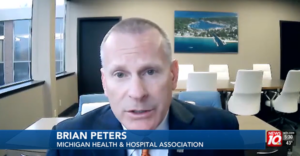The following letter is on behalf of all Michigan hospitals and health systems signifying their unified opposition to proposed House Bills 4550-4552, which threaten to put patient care at risk across Michigan.
Dear Michigan Families,
Our shared mission as hospitals is to advance the health of individuals and communities. For decades, we’ve worked collaboratively – not competitively – on the things that matter most to you: delivering safe, high-quality care when you need it, where you need it, whether that’s in downtown Detroit or the farthest reaches of the Upper Peninsula and everywhere in between. Maintaining timely access to services for every patient is what we work to preserve every single day.
Unfortunately, the Michigan Legislature is currently considering legislation that would result in the closure of more than 5,100 hospital beds statewide. That’s the equivalent of closing every hospital north of Grand Rapids and Flint. The legislation sounds good in a sound bite: more nurses at the bedside, ‘round the clock. But like most things in life, it’s not that simple. Michigan hospitals currently have 8,400 nurse openings posted on job boards. Hospitals are focused at the local level on listening to nurses, getting them the resources they need to do their jobs effectively and have work-life balance, and protecting them from violent attacks in the workplace. Hospitals proudly fought to get tougher penalties enacted for visitors who attack healthcare workers, and this week that bill will go to Governor Whitmer’s desk. We’re also focused on building effective care teams and not relying only on RNs to care for patients 24/7. We’re partnering with higher education to build nurse training and education programs and capacity.
Sadly, House Bills 4550 – 4552 override local nurses’ decision-making about how to staff their units and care for patients. Instead, they would implement a government mandate that would apply a one-size-fits-all nurse-to-patient ratio for RNs in every hospital, no matter its size, location, how sick its patients are or how experienced its nurses and care teams are. We, 100% of Michigan’s hospitals, stand united in our opposition to this misguided legislation. The Michigan Organization of Nursing Leadership and the American Nurses Association – Michigan, who both recognize the unintended consequences the legislation would have on patient access, also oppose mandated staffing ratios.
We all want more nurses. That’s why we’re trying to hire 8,400 of them today. For hospitals to meet the mandates in the legislation, they would have to find more than 13,000 nurses to hire. If we can’t fill the 8,400 openings we have now, how would we fill 13,000 positions – and at a time when nurses are also critically needed in nursing homes and other settings? Unfortunately, this legislation will force the hospitals you rely on to be there if you’re in a car accident, fall off the ladder hanging Christmas lights or are battling a terrible disease, to either break the law and keep services running without the mandatory nurse ratios (which will also make healthcare more expensive due to billion dollars in fines that will be assessed), or instead, they will close services and beds. That means longer wait times for everything from emergency visits to surgeries. It means many of Michigan’s 130 hospitals could all be “on diversion” at the same time, meaning patients get bounced around because nobody has open beds. This is an awful experience for patients and could be deadly especially in Michigan’s rural areas or amidst bad weather. Studies have proven that statewide nurse patient ratios implemented in California did not improve safety or outcomes. Their hospitals overall are not safer than Michigan’s. Nurses did not flock to California when they adopted ratios. In fact, California currently has a nurse shortage numbering in the tens of thousands. Ratios didn’t fix that – and it won’t fix the shortage in Michigan.
Hospitals and our nurse leaders – as well as a large coalition of organizations across industries, who all oppose this legislation – are imploring the Legislature to preserve access to care, and let local patients’ needs drive a hospital’s staffing models. Let’s use innovative programs like virtual nursing to support patient care and let nurses do the bedside work they do best. Let our care teams work together across professions to ensure a patient gets what they need and we maintain a robust and diverse pipeline of patient care professionals. Let’s work together on common-sense solutions that nearly every other state has adopted, like being part of the national Nurse Licensure Compact allowing licensed nurses to work in other states. Let’s work together on rebuilding our nursing and patient care professional talent pipeline.
Adopting misguided legislation that will reduce services and close hospital beds, and that will do nothing to create the thousands of new nurses we need in Michigan, is bad public policy. Instead, let’s remember that there’s so much we have done, and can do, together. Let’s get to work on real solutions that will protect patients, protect access, grow the nursing workforce and ensure those nurses have safe, fulfilling workplaces.
Sincerely,
Brian Peters
CEO
Michigan Health & Hospital Association
Carol Schmidt
SVP Ascension, & Ministry Market Executive
Ascension Michigan
Dean Kindler MD
President & CEO SW Region
Ascension Borgess, Lee, Pipp & Allegan Hospitals
Douglas Apple MD
Chief Clinical Officer & Interim President and CEO Ascension Genesys Hospital
Michael Wiemann MD
Regional President & CEO
Ascension Michigan – Southfield, Novi, Rochester
Kevin Grady MD
Regional President & CEO
Ascension Michigan – Warren, Madison Heights, St. John and River District
Jordan Jeon
Interim Regional President Ascension
Ascension Standish Hospital and St. Joseph
Christine Harff BSN
Regional President, Upper Peninsula
Aspirus Iron River, Keweenaw and Ontonagon Hospitals
Paula Chermside
Chief Administrative Officer
Aspirus Ironwood Hospital & Clinics, Inc.
Rob Stowe
Chief Executive Officer
Baraga County Memorial Hospital
Maria Behr
President
Beacon Health System – Three Rivers Health System, Inc.
Dustin Ames
Chief Executive Officer
Beaumont Behavioral Health
Bill Manns
President & CEO
Bronson Healthcare Group
Steve Vernon
Chief Executive Officer
Cedar Creek Hospital
Fazleomar Mahmood MD
Chief Medical Officer
Chelsea Hospital
Benjamin Miles
President
Chelsea Hospital
Cheryl Taylor MSN, RN
Chief Nursing Officer
Chelsea Hospital
Tina Freese Decker
President & CEO
Corewell Health
Andrea Leslie MSN, RN
Regional Market Leader
Corewell Health Big Rapids, Greenville, and Reed City Hospitals
Darryl Elmouchi MD
Interim President, Corewell Health in Southeast Michigan
Corewell Health East
Chris Fox RN
Chief Nursing Officer
Corewell Health Lakeland Hospitals – St. Joseph Hospital
Drew Dostal BSN
Regional Market Leader
Corewell Health Ludington and Gerber Hospital
Bill Hoefer
Market Leader
Corewell Health Pennock and Zeeland Hospitals
Loren Hamel MD
President, Corewell Health in Southwest Michigan
Corewell Health South
Connie Harmon RN
Chief Nursing Officer
Corewell Health Watervliet Hospital
Alejandro Quiroga MD
President of Corewell Health West
Corewell Health West
Debbie Guido-Allen BSN, RN
President
Corewell Health’s Beaumont Hospital, Dearborn
Derk Pronger
President
Corewell Health’s Beaumont Hospital, Farmington Hills and Grosse Pointe
Daniel Carey MD
President
Corewell Health’s Beaumont Hospital, Royal Oak
Kristine Donahue RN
President
Corewell Health’s Beaumont Hospital, Taylor, Trenton and Wayne
Nancy Susick MSN, RN
President
Corewell Health’s Beaumont Hospital, Troy
Beth Charlton BSN, RN
President/CEO
Covenant HealthCare
Angela McConnachie MSN, RN
Chief Executive Officer
Deckerville Community Hospital and Marlette Regional Hospital
Brittany Lavis
Group Chief Executive Officer
Detroit Medical Center
Archie Drake BSN
Chief Executive Officer
DMC Children’s Hospital of Michigan
Brady Dubois
Chief Executive Officer
DMC Detroit Harper and Receiving Hospitals
Patty Jobbit
Chief Executive Officer
DMC Rehabilitation Institute of Michigan
Lance Beus
Chief Executive Officer
DMC Huron Valley-Sinai Hospital
Gary Purushotham
Chief Executive Officer
DMC Sinai-Grace Hospital
Timothy Johnson
President and Chief Executive Officer
Eaton Rapids Medical Center
Michael Nanzer
Chief Executive Officer
Forest View Hospital
Saju George
Regional CEO – Prime Healthcare MI Market
Garden City Hospital and Lake Huron Medical Center
Jill Wehner
President & CEO
Harbor Beach Community Hospital Inc.
Jamie White
Chief Executive Officer
Havenwyck
Michael Beaulieu MD
Chief Medical Officer
Helen Newberry Joy Hospital & Healthcare Center
Hunter Nostrant
President & Chief Executive Officer
Helen Newberry Joy Hospital & Healthcare Center
Michele Petersen MSN, BSN, RN
Chief Nursing Officer
Helen Newberry Joy Hospital & Healthcare Center
Robert Riney
President and CEO
Henry Ford Health
Andrew Daniels
President & CEO
Hills & Dales General Hospital
Jeremiah Hodshire
President & Chief Executive Officer
Hillsdale Hospital
Dale Sowders
Chief Executive Officer
Holland Hospital
Patti VanDort MSN, RN
President
Holland Hospital
Melany Gavulic RN
President and CEO
Hurley Medical Center
Kevin Rogols
Chief Executive Officer
Kalkaska Memorial Health Center
Karen Cheeseman
President & Chief Executive Officer
Mackinac Straits Health System, Inc.
Amanda Shelast
President
Marshfield Medical Center – Dickinson
Kent Riddle
Chief Executive Officer
Mary Free Bed Rehabilitation
Steve Barnett CRNA
President & CEO
McKenzie Health System
Darrell Lentz
President & CEO
McLaren Bay Region
Connie Koutouzos
President & CEO
McLaren Caro Region & McLaren Thumb Region
Robert David
President and Chief Executive Officer
McLaren Central Michigan
Jeannie Sage MSN, RN
Chief Nursing Officer
McLaren Central Michigan
Chris Candela
President & CEO
McLaren Flint
Kirk Ray
President & CEO
McLaren Greater Lansing
Philip Incarnati
President and Chief Executive Officer
McLaren Health Care
Tim Vargas
President & CEO
McLaren Lapeer Region
Thomas Brisse
President & CEO
McLaren Macomb
Chad Grant
Executive Vice President and Chief Operating Officer
McLaren Northern Michigan
Tracey Franovich RN
President & CEO
McLaren Oakland
Eric Cecava
President & CEO
McLaren Port Huron
Brian Long
President and CEO
Memorial Healthcare
Marilyn Beverly
President, Board of Trustees
Munising Memorial Hospital
Jim Parker
Chief Executive Officer
Munising Memorial Hospital
Edwin Ness
MHC President & CEO
Munson Healthcare
Peter Marinoff
Cadillac Community President, South Region President
Munson Healthcare Cadillac Hospital
Joanne Schroeder
President
Munson Healthcare Charlevoix Hospital
Kirsten Korth-White
President and CEO, Grayling Hospital & East Region President
Munson Healthcare Grayling Hospital
Kelly Tomaszewski MSN, RN
President
Munson Healthcare Manistee and Paul Oliver Memorial Hospital
Christopher Squire
Community Hospital President
Munson Healthcare Otsego Memorial Hospital
Kathy Laraia
Interim President
Munson Medical Center
Lydia Watson MD
President and Chief Executive Officer
MyMichigan Health
Marita Hattem-Schiffman
Central Region President
MyMichigan Medical Center Alma, Clare and Mt. Pleasant
Michael Erickson
President Northern Region
MyMichigan Medical Center Alpena
Ray Stover
Eastern Region President
MyMichigan Medical Center Gladwin and West Branch
Chuck Sherwin
President
MyMichigan Medical Center Midland
Kevin Kalchik
President
MyMichigan Medical Center Sault
Gregg Beeg
President & CEO
Oaklawn Hospital
Kelly Jefferson MSN, RN
President
OSF St. Francis Hospital and Medical Group
Mark Eastburg
President and Chief Executive Officer
Pine Rest Christian Mental Health Services
Julie Yaroch DO
President
ProMedica Charles & Virginia Hickman Hospital
Darrin Arquette
President
ProMedica Monroe and Coldwater Regional Hospitals
Ross Ramsey MD
President and CEO
Scheurer Health
Andy Bertapelle MSN, RN
Chief Executive Officer
Schoolcraft Memorial Hospital
Lili Petricevic BSN
Chief Executive Officer
Sheridan Community Hospital
Mark Brisboe
President
Sparrow Carson and Clinton Hospital
Linda Reetz BSN, RN
President
Sparrow Eaton and Ionia Hospitals
Denny Martin DO
President, University of Michigan Health-Sparrow Lansing
Sparrow Hospital
Bradley Bescoe
President and CEO
Straith Hospital for Special Surgery
Bobby Morin
Chief Operating Officer and CFO
Sturgis Hospital
Rob Casalou
President & CEO
Trinity Health Michigan, Florida and Georgia Regions
Shannon Striebich
President & CEO
Trinity Health Michigan
Katy Hoffman MSN, RN
Chief Nursing Officer
Trinity Health Ann Arbor and Livingston
David Vandenberg MD
Chief Medical Officer
Trinity Health Ann Arbor and Livingston
Alonzo Lewis
President
Trinity Health Ann Arbor Hospital
Shelleye Yaklin
President
Trinity Health Grand Haven Hospital
Michelle Pena MSN, RN
Chief Nursing Officer
Trinity Health Grand Rapids
Matthew Biersack MD
President
Trinity Health Grand Rapids Hospital
Cindy Elliot MD
President
Trinity Health IHA Medical Group
Mohammad Salameh MD
Chief Medical Officer
Trinity Health IHA Medical Group
John O’Malley
President
Trinity Health Livingston Hospital
Nick Nickolopoulos BSN, RN
Chief Nursing Officer
Trinity Health Livonia
Lisa Kinsey Callaway MD
Chief Medical Officer
Trinity Health Medical Group – West Michigan
Douglas Dascenzo DNP, RN
Regional Chief Nursing Officer
Trinity Health Michigan
Rosalie Tocco-Bradley MD
Chief Clinical Officer
Trinity Health Michigan
Linda Dunmore RN
Chief Nursing Officer
Trinity Health Muskegon
Gary Allore
President
Trinity Health Muskegon Hospital
Fabian Fregoli MD
Chief Medical Officer
Trinity Health Oakland
Marschall Runge MD
Chief Executive Officer
Michigan Medicine
Margaret Dimond
Regional System President
University of Michigan Health
Ronald Grifka MD
President & CMO
University of Michigan Health – West
David Miller MD
President
University of Michigan Health
Mitch Leckelt
Chief Executive Officer
UP Health System – Bell
Gar Atchison
Chief Executive Officer
UP Health System – Marquette
Tonya Darner
Interim CEO
UP Health System – Marquette
Ryan Heinonen MSN, RN
Chief Executive Officer
UP Health System – Portage

 The last four years have generated tremendous awareness about vaccines, but also a large public health challenge as disinformation has exploded and anti-vaccine sentiment has emerged from the fringes to become widely embraced. This likely isn’t news to any of you, but the issue is once again top of mind because this time of year is respiratory illness season, whether it be the flu, RSV and now COVID. Thankfully, we have vaccines available to blunt the severe impacts of these illnesses, but it falls on both healthcare providers and public health professionals to appropriately communicate the benefits of vaccines to our patients and the public.
The last four years have generated tremendous awareness about vaccines, but also a large public health challenge as disinformation has exploded and anti-vaccine sentiment has emerged from the fringes to become widely embraced. This likely isn’t news to any of you, but the issue is once again top of mind because this time of year is respiratory illness season, whether it be the flu, RSV and now COVID. Thankfully, we have vaccines available to blunt the severe impacts of these illnesses, but it falls on both healthcare providers and public health professionals to appropriately communicate the benefits of vaccines to our patients and the public.





